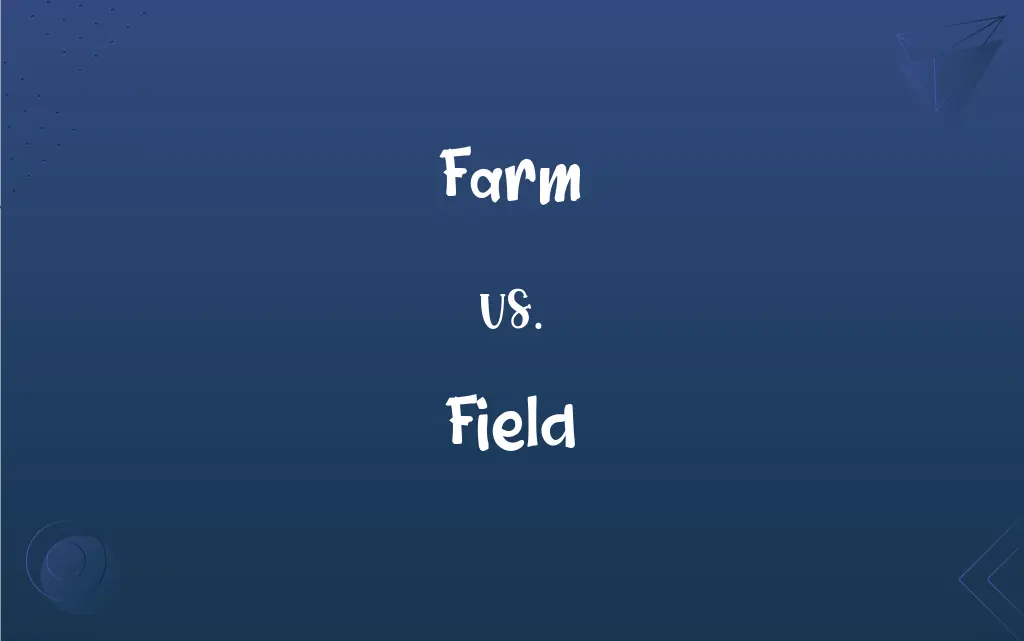Farm vs. Field: What's the Difference?
Edited by Aimie Carlson || By Janet White || Published on December 20, 2023
A farm is a piece of land used for growing crops or raising animals; a field is an open area of land, often part of a farm, used for cultivation or pasture.

Key Differences
A farm is a specific type of property dedicated to agricultural activities, such as crop cultivation or livestock rearing. In contrast, a field is a specific section of land, often within a farm, that is used for growing crops or as pasture for animals. Farms encompass a range of agricultural operations, whereas fields are more narrowly focused on cultivation or grazing.
Farms often consist of multiple fields, buildings, and facilities necessary for farming operations. Fields are the open spaces within a farm where agricultural activities like planting, growing, and harvesting take place. The concept of a farm includes the overall management and infrastructure, while a field refers specifically to the land used for agricultural production.
The size and nature of a farm can vary greatly, from small family-run properties to large commercial enterprises. Fields, on the other hand, are typically defined by their use and the type of crop or animal they support. Farms represent the broader entity of agricultural business, whereas fields are the individual units of land used within this system.
In terms of ownership, a farm is a property that can be owned, leased, or managed by individuals or entities. A field is a part of a farm and does not typically represent a separate ownership unit. Farms are complex systems that involve aspects of business, ecology, and community, while fields are more straightforward areas designated for agricultural use.
From an ecological perspective, farms can have diverse ecosystems, incorporating fields, forests, water bodies, and other habitats. Fields are usually more homogenous, dedicated to a single type of land use, whether it’s crop cultivation or grazing. Farms play a critical role in food production and rural economies, while fields are the specific sites where this production occurs.
ADVERTISEMENT
Comparison Chart
Definition
Land used for agriculture, including crops/livestock
Open land for cultivation or pasture
Components
Includes fields, buildings, facilities
Part of a farm, focused on specific land use
Scale and Nature
Can vary in size, diverse agricultural activities
Typically uniform, dedicated to a single crop/animal
Ownership and Management
Property owned or managed for farming
Part of a farm, not separately owned
Ecological Aspect
Diverse ecosystems, multiple land uses
Homogenous land use, specific to crop or pasture
ADVERTISEMENT
Farm and Field Definitions
Farm
A farm is a property where agriculture and livestock rearing are practiced.
They own a dairy farm in the countryside.
Field
In sports, field refers to an area where a game is played.
The soccer team practiced on the field every afternoon.
Farm
Farm can be used metaphorically to mean a source or supply of something.
The region is a farm of renewable energy resources.
Field
A field is an open area of land used for growing crops or grazing animals.
The wheat field was ready for harvest.
Farm
Farm can also refer to the business of operating an agricultural enterprise.
Her family has been in the farming business for generations.
Field
Field can describe a place where practical work or research is conducted.
The scientists conducted field studies in the rainforest.
Farm
In a broader sense, farm encompasses land, buildings, and machinery used in agriculture.
The farm was equipped with the latest agricultural technology.
Field
Field can imply a realm or domain of activity or interest.
He has made significant contributions to the field of artificial intelligence.
Farm
Farm can imply a place where specific types of animals are raised.
A fish farm focuses on breeding and raising fish commercially.
Field
Field can also mean a wide area of study or interest.
She is an expert in the field of molecular biology.
Farm
A tract of land cultivated for the purpose of agricultural production.
Field
A broad, level, open expanse of land.
Farm
A tract of land devoted to the raising and breeding of domestic animals.
Field
A meadow
Cows grazing in a field.
FAQs
Can a farm have multiple types of fields?
Yes, a farm can have diverse fields for different crops and livestock.
Are fields used only for agriculture?
Primarily, but fields can also be used for research, sports, and other activities.
How do farms impact the environment?
Farms can both positively and negatively impact the environment, depending on their practices.
Can fields be used for non-agricultural purposes?
Yes, fields can be repurposed for recreational, research, or conservation purposes.
How do farms contribute to the economy?
Farms are crucial for food production, employment, and supporting rural economies.
What is a family farm?
A family farm is operated and often owned by a family, typically passed down through generations.
Are fields important for biodiversity?
Yes, fields can support biodiversity, especially when managed sustainably.
How do technological advancements impact farms?
Technology enhances farm efficiency, productivity, and sustainability.
Is a field always part of a farm?
Typically, but fields can also exist independently for specific agricultural or recreational purposes.
Do all farms raise animals?
No, some farms focus exclusively on crop production.
How does the size of a farm affect its operation?
Farm size can influence the types of crops, the number of livestock, and the methods of operation.
What activities take place on a farm?
Farm activities include crop cultivation, livestock rearing, and agricultural management.
Is irrigation necessary for all fields?
Not all, but many fields require irrigation for optimal crop growth.
Can fields be natural habitats?
Yes, fields can be managed to support wildlife and natural ecosystems.
Are there different types of farms?
Yes, including crop farms, livestock farms, mixed farms, and more.
Do fields require regular maintenance?
Yes, fields need maintenance like plowing, planting, and harvesting.
How do climate conditions affect farms?
Climate greatly influences farm operations, crop choices, and livestock well-being.
Can a field be used for multiple crops?
Yes, fields can be used for crop rotation or multi-cropping.
Can a farm exist in an urban area?
Yes, urban farms are becoming more common for local food production.
Are there educational farms?
Yes, some farms serve educational purposes, teaching about agriculture and sustainability.
About Author
Written by
Janet WhiteJanet White has been an esteemed writer and blogger for Difference Wiki. Holding a Master's degree in Science and Medical Journalism from the prestigious Boston University, she has consistently demonstrated her expertise and passion for her field. When she's not immersed in her work, Janet relishes her time exercising, delving into a good book, and cherishing moments with friends and family.
Edited by
Aimie CarlsonAimie Carlson, holding a master's degree in English literature, is a fervent English language enthusiast. She lends her writing talents to Difference Wiki, a prominent website that specializes in comparisons, offering readers insightful analyses that both captivate and inform.







































































